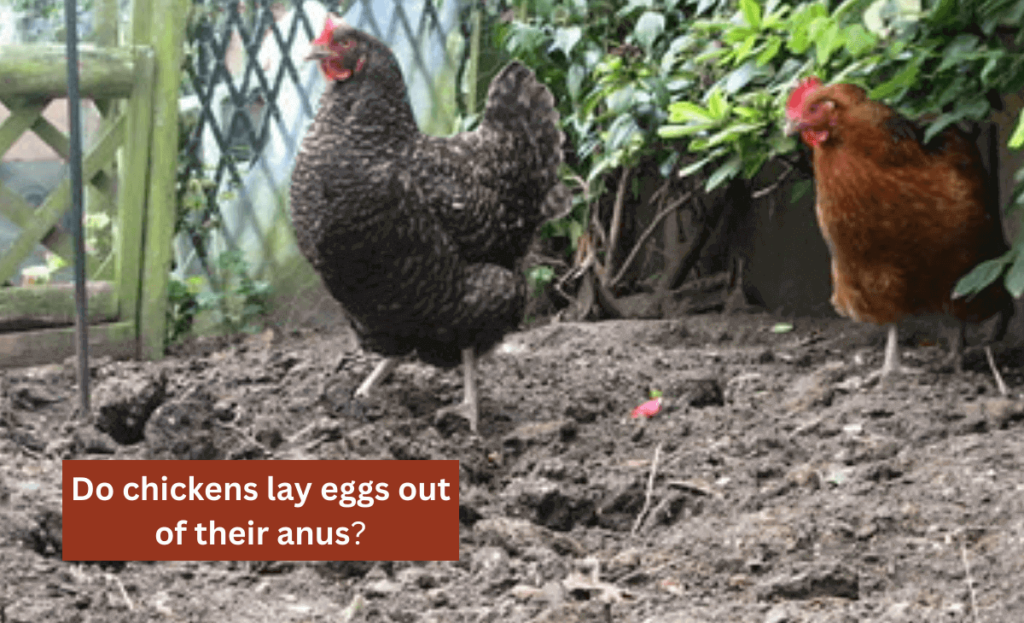For centuries, people have been asking themselves the question, do chickens lay eggs out of their anus? Some believe that chicken eggs exit through the same hole that solid waste does, while others believe there is a separate entrance and exit for eggs.
Let’s find out the answer to this age-old question once and for all. Do chickens lay eggs from their anus?
Do chickens lay eggs from their anus, vagina, or special egg holes?
Unlike humans, chickens do not have an anus or sexual organs. They have what is called a cloaca, like most birds. Chicken’s cloaca is a universal hole or opening where they excrete waste like poop or pee. This cloaca is also designed for mating and laying eggs.
As it turns out, chickens have butts since their cloaca lies at the base of their tail, but that does not mean hens lay eggs from their butts.
The egg travels down the chicken’s oviduct and is laid through the vent. The vent is an external opening located at the back end of the chicken’s abdomen.
Many people call this cloaca the chicken egg hole because it does not function the same as human organs. It is their only exit and entrance point, as discussed above.
How many buttholes does a chicken have? (Vent)
Female chickens have only one rear orifice with three functions. It is the exit point for feces and eggs and the entry point for sperm.
There are only two functions associated with the cloaca of the rooster. The first is to pass feces.
Does it hurt a Chicken to lay an egg | Chickens lay Eggs
Most chickens do not seem to be in pain while laying eggs unless the eggs are very large, especially in young hens. A few signs include occasional wheezing, gasping vocalizations while laying, and minor bleeding from the vents.
The presence of blood in your chicken’s eggs could be a sign of cannibalism, vent pecking, or a prolapsed cloaca.
As a result, most people do not drink water from boiled eggs since it may contain dirt that may harm our health.
If you ask what happens if an egg gets broken inside the chicken? If an egg breaks inside the chicken, it will be absorbed back into the hen’s body. Eggs hatched inside a hen’s body can cause internal laying and is dangerous for the hen and may lead to death.
What is the Development Path of a Chickens eggs Through the Hens Body?
The journey of a chicken egg begins as an ovum, or yolk, in the hen’s ovary. From there, it travels through the oviduct to the shell gland, where the egg white (albumen) and shells come together. Finally, it reaches the cloaca and passes through the vent.
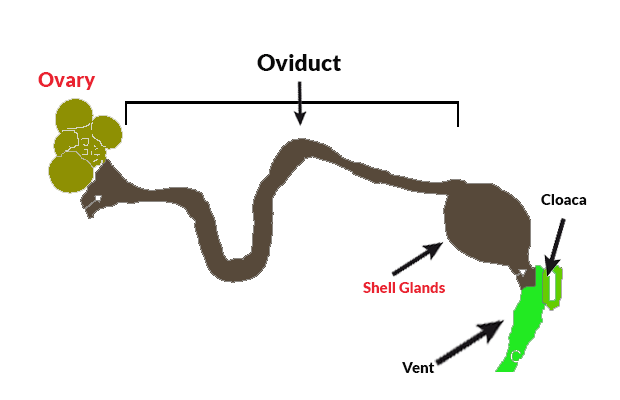
Now, let’s get to know how the reproductive systems of male and female chicken works!
How does the Chicken Reproductive System work for Hen
- Ova– Ova is the female reproductive cells of animals, including humans. In chickens, they are produced in the ovaries and are released into the oviducts.
- Oviduct– The oviduct is a muscular tube that transports the ovum from the ovary to the shell gland. It contains cilia, which help the ovum move.
- Shell Gland– Its function is to add egg white and shells to the ovum during egg production.
- Uterus – This is where the embryo develops before it hatches.
- Cloaca – The Cloaca serves as both an exit and an entrance for solid waste and eggs. During mating, it is also where sperm enters and where eggs are laid.
How does the Chicken Reproductive System work for Roosters
- Testes – Testes are the organs that produce sperm.
- Sperm Tubes – Sperm are transported to the cloaca from the testes through sperm tubes.
- Rectum – The rectum stores solid waste before it passes through the cloaca.
- Cloaca – The Cloaca serves as both an exit and an entrance for solid waste and eggs. During mating, it is also where sperm enters and where eggs are laid.
What happens if a Chicken does not Mate?
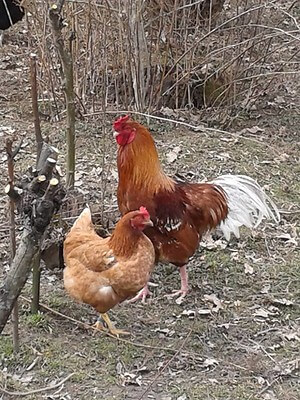
If a chicken does not mate, it will not lay fertile eggs. However, they will still continue to lay unfertilized eggs. These eggs can still be eaten and used the same way as fertilized eggs.
Chickens need to have a rooster present in order to ensure the successful breeding and hatching of chicks.
Courting
Courting is the process when a rooster and hen show interest in each other and decide to mate. During this time, the rooster will chase the hen and often crow to show his interest. The hen will also respond with certain behaviors, such as squatting down, which indicates that she is ready to mate.
Mating
Mating is when the actual act of copulation takes place. The rooster will mount the hen and insert its cloaca into the female’s cloaca. This process can last anywhere from a few seconds to a few minutes. During this time, the hen’s ovary will release an egg traveling down her oviduct.
Mating is necessary for a hen to lay fertilized eggs. If a chicken does not mate, it will still lay eggs but be infertile.
Fertilization
Fertilization is when the sperm from the rooster combines with the ovum of the hen. This combination forms a zygote, which will develop into an embryo and eventually hatch into a chick.
How long does it take for a Hen to an Egg production?
It takes a hen about 24-26 hours to produce an egg. This process begins when the ovum is released from the ovary and ends when the egg is laid.
How long does it take for a Hen to Lay eggs?
Chickens typically lay one egg every 24-26 hours. However, this can vary depending on the breed of chicken and the time of year. Some chickens may lay more frequently during the spring and summer, while others may slow down during the winter.
Why is the process of egg-laying called oviparous deposition?
Laying an egg is called oviparous deposition because the egg is deposited outside the body. Unlike viviparous animals, which give birth to live young.
What are some common misconceptions about Chickens?
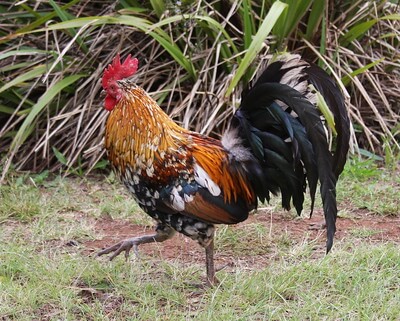
Check out these common misconceptions about chickens to learn about chicken reproduction and laying eggs.
Chickens are often thought of as dirty animals that carry diseases.
Chickens are pretty clean and don’t carry many diseases. This instance highly depends on how they are raised, though. If chickens are kept in a clean and healthy environment, they are less likely to carry diseases.
Chickens are stupid animals.
The truth is chickens are quite intelligent and capable of solving complex problems, which is quite surprising for their size.
Many believe chickens are only used for meat and eggs.
Chickens are also great pets and can provide companionship.
That chicken can lay more than one egg a day.
This claim is impossible. Chickens can only lay a single egg per day. Mornings tend to be the best times for laying eggs, followed by afternoons and evenings.
A hen needs a cockerel to lay eggs.
A hen will lay eggs with or without a cockerel. The cockerel only helps fertilize the eggs.
All hybrid broilers are males.
Broilers have males and females in them. Male broilers are bigger and have combs and wattles when they are 6-7 weeks old. Female broilers can lay eggs as early as six months old if they don’t die of heart attack or congestive heart failure.
That cocks can only crow in the morning.
Cocks can crow any time of the day. They can even crow at night when startled. Crowding is the only way a cock can alert other members of impending danger and act as a way of showing dominance.
Eggs with yellow yolks are more nutritious than those without
Not true. Nutritional content is the same whether yellow, orange, or grey yolk though eggs from free-range chickens are tastier than housed hens.
All organic medications for chickens are safe.
Modern medications are much less harmful if given correctly. Snake poison is natural. Does it mean it is safe? Most organic products have not undergone scientific testing.
Broilers are fed steroids and hormones.
This statement is not true. Genetics, nutrition, housing, and proper management have allowed broiler birds to gain and grow weight faster. In poultry, hormones and steroids are prohibited and illegal to use. Chickens, like any other bird, provide a nutritious source of protein.
When chickens eat eggs and cannibalize each other, they lack calcium.
Big lie. Chickens would continue with these behaviors even if you provide enough calcium. These behaviors are called vices and can be corrected by proper spacing, debeaking, and wound treatment.
Some Interesting Facts about Chicken Reproduction that you may not know!
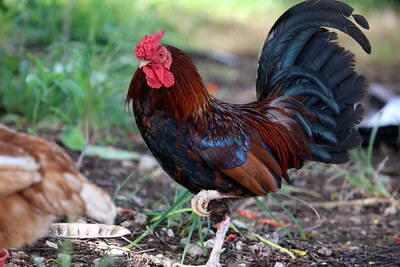
- Chickens have two ovaries, but only one of them is functional. The functional ovary is located on the left side of the chicken’s body.
- Chickens can mate with multiple partners and produce offspring that are a mixture of all the different fathers.
- A Female chicken may produce a fart egg that is a tiny egg or egg without yolk or egg white. Young chickens laying the first time may lay a fart egg.
Related Questions
At what age do chickens stop laying eggs?
At the age of 6 or 7 years, egg laying hens start laying fewer eggs.
Do chickens fart?
Chickens pass gas for the same reason that other animals do. Chicken farts because it has air pockets inside its intestine.
Final Thoughts – do chickens lay eggs out of their anus
As you can see, chickens are fascinating creatures, and their reproductive process is just one of the many things that make them unique. Chickens play an important role in our ecosystem and provide us with food, eggs, and companionship.
I hope this article has helped you learn about chicken reproduction and dispel some common misconceptions about these amazing animals.

